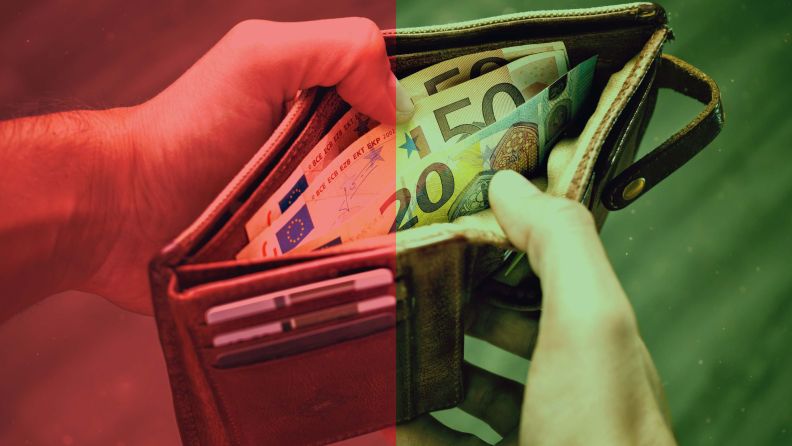Pro & Contra
Abandoning cash?
Business journalist Sophie Schimansky would ideally prefer just digital payment, businessman Friedemann Berg sees an element of freedom in cash.

Cash: We seldom “have the exact amount” and the numerous coins in your wallet or purse can be pretty irritating – don’t you think?

It certainly irritates me. I almost never carry cash and frequently leave home with just my smartphone. I don’t have to rummage through my pockets or count out coins at the till. That saves time – for the cashier, other people in the queue and for me myself. I know precisely which cafés and restaurants only accept cash. If I want to go there, I come prepared. Or one of my friends will pay on my behalf and I’ll send her the money by digital transfer.

It’s true – loose change can sometimes seem inconvenient. Yet this is exactly where there’s also an element of freedom: cash gives us complete control of our expenditure, every cent literally in our hand. That we sometimes “don’t have the exact amount” is often only a question of habit. The jingling in a wallet or purse is also not a disadvantage, but rather an audible substantiation of lived sovereignty. Cash functions without electricity, without network connectivity, without third-party providers. The acceptance of cash represents consumer protection and the expression of a basic democratic principle, freedom of choice.
Are you not safer with less cash in your pocket when you’re out and about?

Absolutely, I feel unsafe with lots of cash. Not just because I think it makes me an easy target, but also because I could lose it. I always have my mobile phone to hand and can locate it if it’s lost. Besides, if someone steals 100 euros from me, I can run after the person or go to the police. Online, I can notify my bank or the payment service provider and in the best case they’ll reimburse me.

Security is undoubtedly a key concern for us all. But it would be too simplistic to link the issue of security solely to the amount of cash in your pocket. Crime shifts – less cash doesn’t automatically increase your level of security, it’s rather the points of attack that are changing: data theft, digital scams and systemic failures show that even digital payment methods involve risks – often with more far-reaching consequences than in the case of a stolen wallet or purse. Cash is tangible, reliable and anonymous. It protects private spheres and provides independence, especially in an increasingly digitised world.
Would we be inclined to spend more money if we only make digital payments?

Not necessarily. When I pay in cash, at the end of the day I often don’t have a good overview of how much I spent on what. Mobile payments can be linked to apps that monitor and analyse my spending behaviour. My bank does this automatically, I can track precisely how much I’ve spent on individual categories like food. I can also set budgets. Then I can see exactly when I’ve been eating out too often in the current month.

There are actually numerous scientific studies which indicate that we tend to spend more when we pay exclusively by digital methods. The reason is obvious: digital payments are convenient, but also abstract. The physical feeling of handing over a banknote creates a direct link to the value of money – a kind of “psychological brake” that helps us to be more conscious of our spending.
Abandoning cash could help in the battle against money laundering – correct?

Yes it could. It involves a balance between transparency and freedom, which is always a fine line. Cash is anonymous and in particular protects those who do business in the shadows. Less cash would make certain forms of money laundering more difficult, but doesn’t provide a fundamental solution to the problem.

The idea that getting rid of cash could help combat money laundering is pretty common – but it’s not the whole story. Cash isn’t the problem, it’s just one possible channel among many. Most major cases of money laundering now involve complex digital structures and international financial transactions – not briefcases full of cash.
Some people say that cash is freedom. Wouldn’t we lose an element of freedom if we abandon cash?

I can understand that well from an emotional perspective, because something new can simply be intimidating. Rationally, not at all. After all, a new money system also means progress and progress should drive us forward – it’s the only way things can improve.

Cash is indeed freedom, and that’s more than just a saying. Cash is a public asset that’s accessible to everyone, irrespective of age or technical affinity. It enables us to conduct our daily business anonymously, directly and without third parties – around the clock, even if servers fail or the network connection is down.